单词讲解及练习
常用学科课程英语单词考点讲解与练习

常用学科课程单词考点讲解与练习一、常用学科类单词释义Subject(lesson):学科、课程;Chinese:汉语,语文;Maths:数学;English:英语;Art:美术;Music:音乐;PE:体育;Science:科学;Physics:物理;Chemistry:化学;Politics:政治;History:历史;Geography:地理;Biology:生物;Computer:电脑。
二、动名词(V+ing)+lesson表达课程dancing lesson:舞蹈课;cooking lesson:烹饪课;swimming lesson:游泳课;running lesson:跑步课;drawing lesson:画画课;fishing lesson:钓鱼课;reading lesson:阅读课。
三、形容课程内容的英语表达Interesting:有趣的;boring:无聊的;exciting:令人激动的;difficult/hard:困难的;easy:容易的;good/great/wonderful:好的,极好的;bad:差劲的;popular:受欢迎的。
四、考点演练(一)英汉互译1、我在星期天有一节游泳课。
(汉译英)2、她每周都有2节舞蹈课。
(汉译英)3、我星期六没有课。
(汉译英)4、吉姆喜欢数学和语文。
(汉译英)5、We don’t have any lessons on Friday.(英译汉)6、She has five lessons in the morning.(英译汉)7、I like Chinese best.(英译汉)8、The reading lesson is boring.(英译汉)(二)句型转换1、I have a PE lesson today.(改为一般疑问句)2、She has an Art lesson in the morning.(改为否定句)3、We have some reading lesson.(改为一般疑问句)4、The English lesson is interesting.(对划线部分提问)5、I like Chinese and Maths.(对划线部分提问)6、He has English lessons.(对划线部分提问)。
高中英语单词练习题及讲解

高中英语单词练习题及讲解1. 单选题:选择下列单词的正确含义。
- (A) Ambiguous: 模棱两可的- (B) Catastrophe: 灾难- (C) Chronicle: 编年史- (D) Deteriorate: 恶化Question: The weather forecast predicts a sudden _______ in the weather conditions.A. AmbiguousB. CatastropheC. ChronicleD. Deteriorate2. 填空题:使用适当的单词填空。
- (A) Inevitable- (B) Insignificant- (C) Inquisitive- (D) IncompatibleQuestion: It is _______ that all good things must come to an end.A. InevitableB. InsignificantC. InquisitiveD. Incompatible3. 同义词替换题:找出下列句子中可以替换划线单词的同义词。
- Sentence: The new policy was met with widespread skepticism.- (A) Doubt- (B) Acceptance- (C) Curiosity- (D) Disagreement4. 反义词匹配题:找出下列单词的反义词。
- (A) Optimistic- (B) Generous- (C) Humble- (D) Confident- (A) Pessimistic- (B) Stingy- (C) Arrogant- (D) Timid5. 句子重构题:使用所给单词重构句子,使其意思不变。
- Original Sentence: The company's profits have been steadily increasing over the past few years.- Given Word: RiseReconstructed Sentence: The company's profits have been _______ over the past few years.6. 词义辨析题:选择与例句中划线部分意义最接近的选项。
Unit 1 词汇讲解+习题-2021-2022学年高中英语牛津译林版(2020)选择性必修第四册
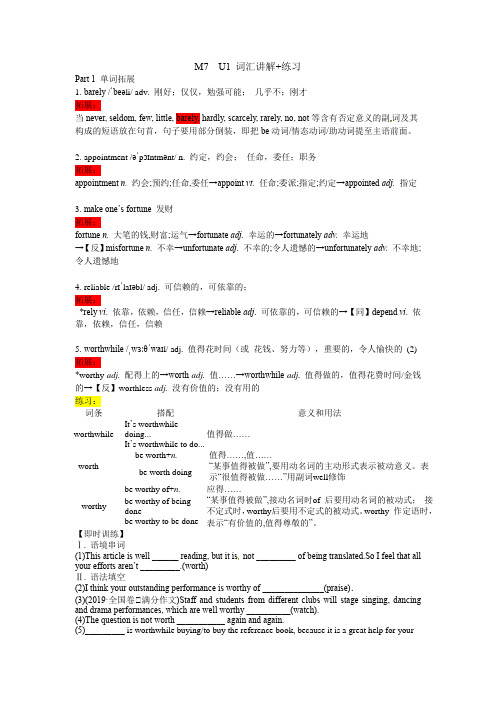
M7 U1 词汇讲解+练习Part 1 单词拓展1.barely /ˈbeəli/ adv. 刚好;仅仅,勉强可能;几乎不;刚才拓展:当never, seldom, few, little, barely, hardly, scarcely, rarely, no, not 等含有否定意义的副词及其构成的短语放在句首,句子要用部分倒装,即把be动词/情态动词/助动词提至主语前面。
2.appointment /əˈpɔɪntmənt/ n. 约定,约会;任命,委任;职务拓展:appointment n.约会;预约;任命,委任→appoint vt.任命;委派;指定;约定→appointed adj.指定3.make one’s fortune 发财拓展:fortune n.大笔的钱,财富;运气→fortunate adj.幸运的→fortunately adv.幸运地→【反】misfortune n.不幸→unfortunate adj.不幸的;令人遗憾的→unfortunately adv.不幸地;令人遗憾地4.reliable /rɪˈlaɪəbl/ adj. 可信赖的,可依靠的;拓展:*rely vi. 依靠,依赖,信任,信赖→reliable adj. 可依靠的,可信赖的→【同】depend vi. 依靠,依赖,信任,信赖5.worthwhile /ˌwɜːθˈwaɪl/ adj. 值得花时间(或花钱、努力等),重要的,令人愉快的(2) 拓展:*worthy adj.配得上的→worth adj.值……→worthwhile adj.值得做的,值得花费时间/金钱的→【反】worthless adj. 没有价值的;没有用的练习:词条搭配意义和用法worthwhile It’s worthwhiledoing...It’s worthwhile to do...值得做……worth be worth+n.值得……,值……be worth doing“某事值得被做”,要用动名词的主动形式表示被动意义。
初中英语词类讲解及练习
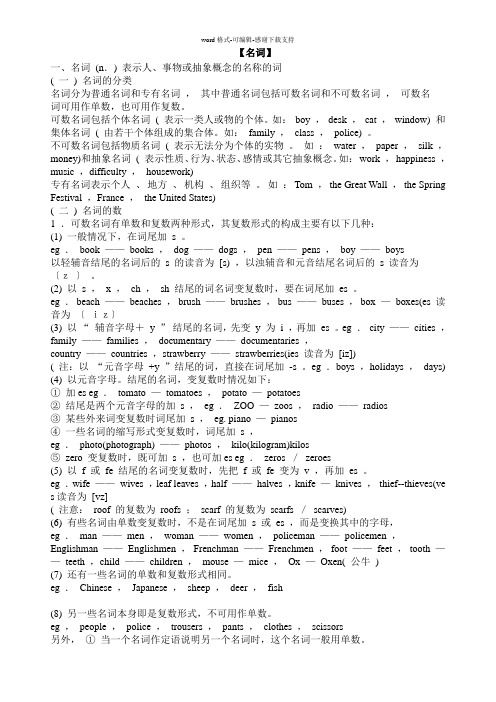
【名词】一、名词(n.) 表示人、事物或抽象概念的名称的词( 一) 名词的分类名词分为普通名词和专有名词,其中普通名词包括可数名词和不可数名词,可数名词可用作单数,也可用作复数。
可数名词包括个体名词( 表示一类人或物的个体。
如:boy ,desk ,cat ,window) 和集体名词( 由若干个体组成的集合体。
如:family ,class ,police) 。
不可数名词包括物质名词( 表示无法分为个体的实物。
如:water ,paper ,silk ,money)和抽象名词( 表示性质、行为、状态、感情或其它抽象概念。
如:work ,happiness ,music ,difficulty ,housework)专有名词表示个人、地方、机构、组织等。
如:Tom ,the Great Wall ,the Spring Festival ,France ,the United States)( 二) 名词的数1 .可数名词有单数和复数两种形式,其复数形式的构成主要有以下几种:(1) 一般情况下,在词尾加s 。
eg .book ——books ,dog ——dogs ,pen ——pens ,boy ——boys以轻辅音结尾的名词后的s 的读音为[s) ,以浊辅音和元音结尾名词后的s 读音为〔z〕。
(2) 以s ,x ,ch ,sh 结尾的词名词变复数时,要在词尾加es 。
eg .beach ——beaches ,brush ——brushes ,bus ——buses ,box —boxes(es 读音为〔iz〕(3) 以“辅音字母+y ”结尾的名词,先变y 为i ,再加es 。
eg .city ——cities ,family ——families ,documentary ——documentaries ,country ——countries ,strawberry ——strawberries(ies 读音为[iz])( 注:以“元音字母+y ”结尾的词,直接在词尾加-s 。
a,an讲解及练习

a,an用法区别a用在以辅音音素开头的单词前,an用在以元音音素开头的单词前,判断一个单词是元音开头还是辅音开头,要根据其读音,而不是根据首字母。
如:an hour, an honest boy,a useful bookThere is an “f” in the word “five”.(在“five"中有字母“f"。
)我们可以这样来记忆:不见元音不加an,不看字母看发音。
(1)在26个字母中,前面用an的字母有:a,e,f, h,i,l,m,n,o,r,s,x,其他用a。
(u 不是)(2)以u开头的单词,要注意区别.如:an umbrella,an unusual story,an unhappy boy,a university,a useful book, a unit (3)以e开头的单词,要注意区别。
如:an egg, a European boy(4)以h开头的单词,要注意区别。
如:an hour, an honest boy(5)注意这几个数字(1,11,与8相关的数字)a one-year—old boyan eveven-year—old boyan eighty—year-old man_____1-year-old girl_____ 11—year-old boy,____ 18—year-old girl1.There is ____“u” in the word “use”.2.There is ____ “h” in the word “there”。
3。
There isn’t ____ university in our town。
4。
Tony is ____ honest boy。
5. London is ____ European city.6. _____ 8—year-old boy is playing games。
7。
There are 60 minutes in ___ hour.8。
二年级单词记忆练习题及讲解
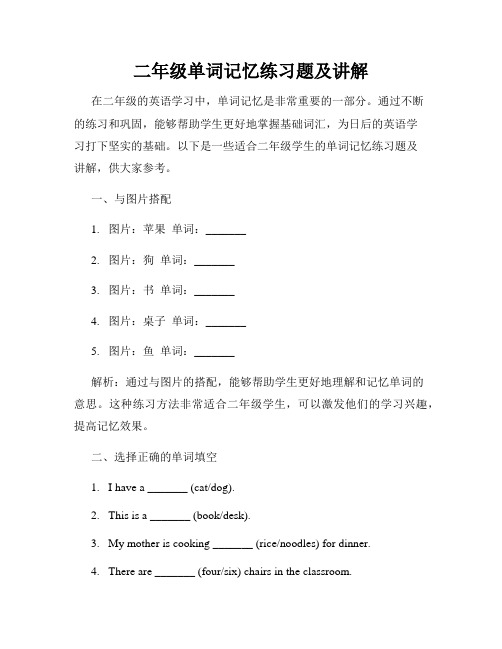
二年级单词记忆练习题及讲解在二年级的英语学习中,单词记忆是非常重要的一部分。
通过不断的练习和巩固,能够帮助学生更好地掌握基础词汇,为日后的英语学习打下坚实的基础。
以下是一些适合二年级学生的单词记忆练习题及讲解,供大家参考。
一、与图片搭配1. 图片:苹果单词:_______2. 图片:狗单词:_______3. 图片:书单词:_______4. 图片:桌子单词:_______5. 图片:鱼单词:_______解析:通过与图片的搭配,能够帮助学生更好地理解和记忆单词的意思。
这种练习方法非常适合二年级学生,可以激发他们的学习兴趣,提高记忆效果。
二、选择正确的单词填空1. I have a _______ (cat/dog).2. This is a _______ (book/desk).3. My mother is cooking _______ (rice/noodles) for dinner.4. There are _______ (four/six) chairs in the classroom.5. Can you see the _______ (bird/fish) in the tree?解析:通过选择正确的单词填空,能够帮助学生巩固单词的拼写和用法。
同时,这种练习形式也能够培养学生的思维能力和判断能力。
三、连线练习1. 手 - Hand2. 脚 - _____3. 头 - _____4. 眼睛 - _____5. 鼻子 - _____解析:连线练习可以帮助学生将中文与英文单词进行对应,巩固单词的记忆和理解。
这种练习方式可以通过绘画、游戏等方式进行,让学习更加有趣和生动。
四、拼出单词请拼出下列单词的正确形式:1. pen - _______2. apple - _______3. cat - _______4. chair - _______5. dog - _______解析:通过拼出单词的正确形式,学生能够更好地记忆单词的拼写和发音。
初中英语十大词性详细讲解和练习题

在英语中,共有10大词类,它们是:名词、动词、形容词、副词、数词、代词、冠词、介词、连词、感叹词。
一、名词1、什么叫名词?名词是表示人、事物、地点或抽象概念的名称。
如:mother妈妈panda熊猫library图书馆pencil 铅笔wish愿望2、名词分类(1)专有名词表示特定的人或事物的名称。
如:Mr. Green格林先生the Spring Festival 春节the Great Wall长城Britain英国提示:关于单词首字母大写1、句首的第一个单词的首字母要大写,Today is Thursday.2、人名:姓和名两个单词第一个字母都大写, Mr. Ye, Mrs. Zhang3、称呼、头衔的第一个字母要大写, Doctor Wang, Chairman Mao4、国家、地名等专有名词第一个字母要大写, Australia, Wuhan, Zhejiang, Wenzhou5、月份、星期几、节假日每个单词的第一个字母都要大写. March, Tuesday, National Day, Labour Day6、语言名称要大写. Chinese, Japanese7、文章标题的每个实词的第一个字母应大写,但不包括of, in, and这样的介词、连词, My Mother School in Cangnan.8、特殊简称如FBI(Federal Bureau of Investigation美国联邦调查局)WTO(World Trade Organization世界贸易组织)等字母都大写.(2)普通名词是不属于特定的人或事物名称的词。
普通名词又分为个体名词和集体名词、物质名词和抽象名词。
个体名词,如:radio(广播),watch(手表);集体名词,如:class(班级),people(人民);物质名词,如:milk(牛奶)water(水);抽象名词,如:work(工作),health(健康)。
Unit 5 单词讲解和练习人教版八年级英语上册

Unit 5 单词讲解1.sitcom n.=(situation comedy) 情景喜剧2.news n.新闻;消息(不可数名词)同information two pieces of news 两条新闻some news 一些新闻3.soap n. 肥皂;soap opera 肥皂剧、连续剧4.mind v. 介意;对(某事)烦恼mind doing sth.介意做某事Would you mind (me/my)opening thedoor?5.stand v.站立;忍受(常用在否定或疑问句中)can't stand doing sth.受不了做某事can't help doing 禁不住做某事can't wait to do sth. 迫不及待做某事cational adj.教育的;有教育意义的n. education 教育P.E. physical educationv. educate 教育7. plan n.计划;方法v.打算;计划三单plans 现在分词planningplan to do sth.计划做某事= make a plan to do sth.I plan to watch a talk show tonight.=I make a plan to watch a talk show tonight.8.hope 希望;期望;盼望n.希望hope to do sth. (注意没有hope sb. to do sth.) 或hope+从句I hope to have a birthday party.I hope(that)I can have a birthday party9. expect v.预期;期待;盼望expect to do sth. 期待做某事(1)expect+名词/代词,期待某人/某事 I expect a big meal after the competition.(2)expect to do sth.期待做某事I expect to win the game.(3)expect that… 期望/预计I expect that I will win the game.10. find out查明、弄清find out, find, look for的区别find 强调找到的结果look for 强调找的过程,但不一定找到I looked for my lost keys everywhere, but I didn’t find it.11. discussion n.讨论;谈论have a discussion about sth. v. discuss讨论12. happen vi.发生;碰巧;出现;偶遇(偶然或突发事件)sb happen to do sth. 某人碰巧做某事sth happen to sb某事发生在某人身上13. may aux.可以,能够;可能,也许+v原maybe adv.副词=possibly=probably14. joke n.笑话;玩笑v.说笑话;开玩笑tell a joke/jokes 讲笑话15. comedy n.喜剧;滑稽;幽默事件pl. comedies16. meaningless adj.无意义的;不重要的adj. meaningful 有意义的n. meaning 意思; 意义17. action n.行为;活动act v. 扮演,行动actress女演员actor男演员action movie动作片18. cartoon n.卡通;漫画cartoon characters 卡通人物19. culture n.栽培;文化;教养adj. cultural有文化的20. famous adj.著名的;有名的be famous for以…著名Hangzhou is famous for its tea.be famous as 作为...而出名Zhu Ting is famous as a volleyball player.21. appear vi.出现;出版;显得disappear v. 消失22. become v.变成;成为系动词23. rich adj.富有的;富饶的;丰富的反义词:poor穷人the rich富人,the poor穷人24. successful adj.成功的;圆满的successfully adv.n. success 成功 a great success一个成功的人/一件成功的事v. succeed 成功succeed in doing sth成功做成某事=be successful in doing sth25. might aux.可能;也许;may的过去式后接动词原形26. main adj.主要的;最重要的main idea主旨adv. mainly 主要地27. reason n.原因;理由28. common 普通的have one thing in common有一个共同之处common people普通人29. film n.电影= movie30. unlucky adj.倒霉的;不幸的;不吉利的adj. lucky 幸运的n. luck 幸运adv. luckily幸运的是adv. unluckily不幸运是31. lose vt.丢失;失败vi.失败-lost get/be lost 迷路32. girlfriend n.女朋友boyfriend 男朋友33. ready adj.准备好的;乐意的be ready to do sth.准备好/乐于做某事Mickey is always ready to help others.be/get ready for sth.为某事做好准备I’m ready for the sports game.34. character n.个性;品质;人物;main character 主要人物35. simple adj.简单的;朴素的;单纯的;笨的= easyadv. simply 仅仅;只36. dress up装扮;乔装打扮dress up as/like sb./sth.扮成/像某人/某物37. take sb.'s place代替;替换=take the place of sb.Mulan took her father’s place to join the army.木兰替父从军。
高中英语必修四book4unit5词汇讲解和练习(含答案)

⾼中英语必修四book4unit5词汇讲解和练习(含答案)BOOK 4 Unit 5 Theme parks 词汇讲解及练习题重难点讲解1. theme n(谈话、写作或乐曲的)主题,题⽬,主旋律theme park主题公园theme song主题歌The theme of our discussion today is “Asia in the1990s”.今天我们讨论的主题是⼆⼗世纪九⼗年代的亚洲。
The theme of the poem is love and peace. 这⾸诗的主题是爱与和平。
2 various adj1. 不同的;各种各样的,形形⾊⾊的Various objects were on the table.桌⼦上摆着各种各样的物体。
At the meeting, the people present expressed their various opinions. 会议上,出席⼈⼠发表了不同观点。
Their hobbies are many and various.他们的爱好五花⼋门。
2. 不⽌⼀个的,各个的,个别的for various reasons由于种种原因For vario us reasons, I’d prefer not to meet him. 由于各种原因,我不愿意见他。
Wheat is grown in various parts of the country. 全国许多地⽅都种⼩麦。
【知识拓展】various是由动词vary(变化)派⽣⽽来的形容词,它的副词形式是variously(不同的)。
variety是名词,意为“变化,多变性,多样性”,⽤a variety of/varieties of表⽰“各种各样的;多种多样的”,后接复数名词,可与various互⽤。
如:There are various colours to choose from.That sort of things varies from person to person.3be famous for以/因……⽽出名be famous as作为……⽽出名She was famous for his novels and poetry.她以⼩说和诗歌⽽闻明。
高中英语词汇练习题及讲解

高中英语词汇练习题及讲解一、词汇填空1. Despite the heavy rain, the concert was still a great________ (成功).2. She has a ________ (天赋) for music and can play several instruments.3. The ________ (环境) around the factory has been severely damaged.4. The ________ (本质) of the problem lies in the lack of communication.5. The ________ (观点) expressed in the article are quite controversial.答案与讲解:1. success - 此空需要一个名词来表示“成功”的意思,所以填入“success”。
2. talent - 空格前有“a”,表明需要一个单数名词,而“talent”意为“天赋”,符合句意。
3. environment - 根据句子结构,空格处需要一个名词来表示“环境”,所以填入“environment”。
4. essence - 空格前的“the”表明需要一个名词,而“essence”意为“本质”,适合填入此处。
5. views - 空格前有“are”,表明需要复数名词,而“view”的复数形式是“views”,意为“观点”。
二、词汇匹配将下列单词或短语与它们正确的定义匹配。
A. InevitableB. AmbiguousC. ContributeD. DeteriorateE. Prioritize1. To make something worse or less effective.2. Something that cannot be avoided.3. To give something, especially money or goods, in order to help a particular cause or person.4. Not expressing things clearly, leading to misunderstanding.5. To decide what order to do things in, especially whenthere are many things to do.答案与讲解:1. D. Deteriorate - 意为“使恶化”或“降低效率”,符合“使某事物变得更糟”的定义。
Module 3 Unit 6 Travel重点词汇及练习(含答案)牛津上海版英语八年级下学期
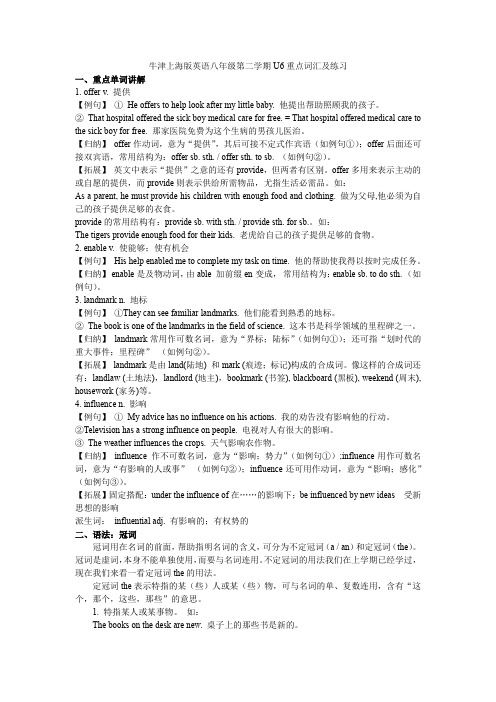
牛津上海版英语八年级第二学期U6重点词汇及练习一、重点单词讲解1. offer v. 提供【例句】①He offers to help look after my little baby. 他提出帮助照顾我的孩子。
②That hospital offered the sick boy medical care for free. = That hospital offered medical care to the sick boy for free. 那家医院免费为这个生病的男孩儿医治。
【归纳】offer作动词,意为“提供”,其后可接不定式作宾语(如例句①);offer后面还可接双宾语,常用结构为:offer sb. sth. / offer sth. to sb. (如例句②)。
【拓展】英文中表示“提供”之意的还有provide,但两者有区别。
offer多用来表示主动的或自愿的提供,而provide则表示供给所需物品,尤指生活必需品。
如:As a parent, he must provide his children with enough food and clothing. 做为父母,他必须为自己的孩子提供足够的衣食。
provide的常用结构有:provide sb. with sth. / provide sth. for sb.。
如:The tigers provide enough food for their kids. 老虎给自己的孩子提供足够的食物。
2. enable v. 使能够;使有机会【例句】His help enabled me to complete my task on time. 他的帮助使我得以按时完成任务。
【归纳】enable是及物动词,由able 加前缀en-变成,常用结构为:enable sb. to do sth. (如例句)。
3. landmark n. 地标【例句】①They can see familiar landmarks. 他们能看到熟悉的地标。
新目标八年级上册英语UNIT3词汇语法讲解与练习

词汇点睛一.基础词汇,写出下列单词。
1较好的(地)2辛勤的3哪一个4有才能的5关心6清楚地7爱交际的8大声地9安静地10极好的二.重点词汇讲解1. better是good/well的比较级,意为“更好的”“较好地”.2.loudly 意为“大声地”是由形容词loud转变的副词用来修饰动词。
和它相同的副词还有quietly ,clearly ,truly 等。
3 .win 意为“获胜,赢”动词,其后接比赛和活动类,但是不能接人.例如,My brother often wins the ping pong games.其过去式为won 名词为winner “获胜者”.4.which“哪一个”特殊疑问词通常对于名词的定语提问5 both “两者都” 位于句中be,情态动词,助动词之后,实意动词之前。
例如,They are both teachers.他们两个都是老师。
We can both ride a bike.我们俩个都会骑车。
My parents both like noodles.我父母都喜欢面条。
Both…and 意为“…和…都” “不仅…而且…”例如Both he and I like watching TV.他和我都喜欢看电视。
6 .as…as意为“和….一样”中接形容词,副词原形。
not so(as)…as“和…不一样”.例如I am as tall as my friend.我和我朋友一样高。
句型透视一、必背句1.Tom比Sam更聪明吗? 不,Sam比Tom更聪明。
Is Tom Sam? No, he . Sam isthan Tom.2.Tara和Tina学习一样努力。
Tara works hard Tim.3.你的父亲和母亲谁更受欢迎?Who is , your father or your mother?二.例句解析1. Both Sam and Tom can play the drums , but Sam plays them better than Tom. Sam 和Tom 都会打鼓但是Sam比Tom 打得更好。
八年级英语人教版下册Unit8_重点词汇讲解及练习
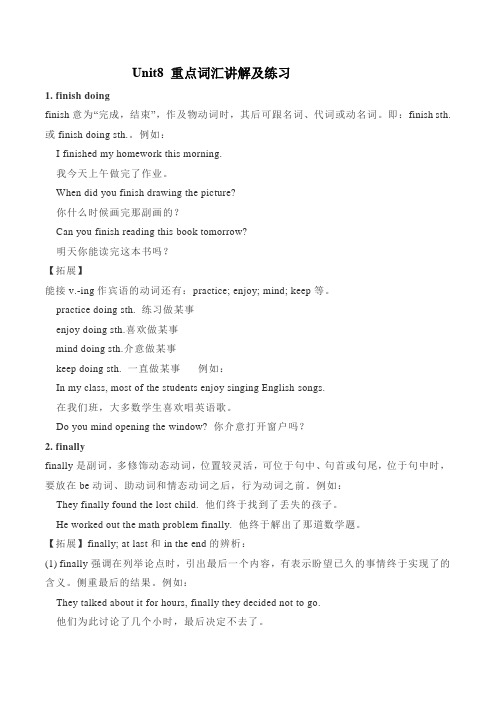
Unit8 重点词汇讲解及练习1. finish doingfinish意为“完成,结束”,作及物动词时,其后可跟名词、代词或动名词。
即:finish sth.或finish doing sth.。
例如:I finished my homework this morning.我今天上午做完了作业。
When did you finish drawing the picture?你什么时候画完那副画的?Can you finish reading this book tomorrow?明天你能读完这本书吗?【拓展】能接v.-ing作宾语的动词还有:practice; enjoy; mind; keep等。
practice doing sth. 练习做某事enjoy doing sth.喜欢做某事mind doing sth.介意做某事keep doing sth. 一直做某事例如:In my class, most of the students enjoy singing English songs.在我们班,大多数学生喜欢唱英语歌。
Do you mind opening the window? 你介意打开窗户吗?2. finallyfinally是副词,多修饰动态动词,位置较灵活,可位于句中、句首或句尾,位于句中时,要放在be动词、助动词和情态动词之后,行为动词之前。
例如:They finally found the lost child. 他们终于找到了丢失的孩子。
He worked out the math problem finally. 他终于解出了那道数学题。
【拓展】finally; at last和in the end的辨析:(1) finally强调在列举论点时,引出最后一个内容,有表示盼望已久的事情终于实现了的含义。
侧重最后的结果。
例如:They talked about it for hours, finally they decided not to go.他们为此讨论了几个小时,最后决定不去了。
四个花费”spend,cost,take。pay讲解及对应中考练习
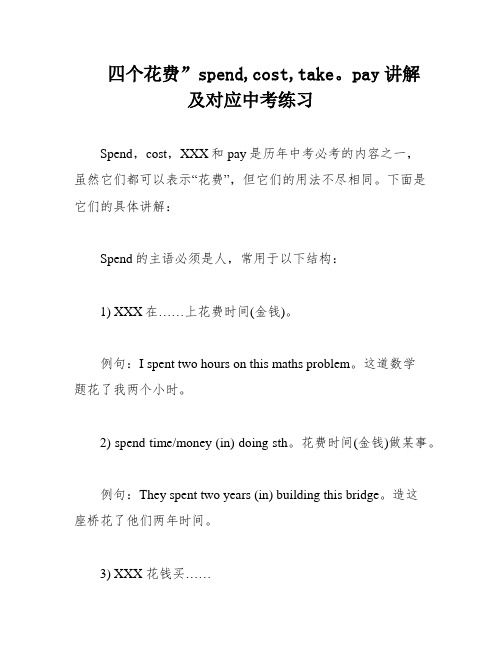
四个花费”spend,cost,take。
pay讲解及对应中考练习Spend,cost,XXX和pay是历年中考必考的内容之一,虽然它们都可以表示“花费”,但它们的用法不尽相同。
下面是它们的具体讲解:Spend的主语必须是人,常用于以下结构:1) XXX在……上花费时间(金钱)。
例句:I spent two hours on this maths problem。
这道数学题花了我两个小时。
2) spend time/money (in) doing sth。
花费时间(金钱)做某事。
例句:They spent two years (in) building this bridge。
造这座桥花了他们两年时间。
3) XXX 花钱买……例句:His money was XXX 他的钱用来买书了。
Cost的主语是物或某种活动,还可以表示“值”,常见用法如下:1) XXX) + 金钱,某物花了(某人)多少钱。
例句:A new computer costs a lot of money。
买一台新电脑要花一大笔钱。
2) (doing) XXX) + 时间,某物(做某事)花了(某人)多少时间。
例句:Remembering these new words cost him a lot of time。
他花了大量时间才记住了这些单词。
注意:cost的过去式及过去分词都是cost,并且不能用于被动句。
Take后面常跟双宾语,常见用法有以下几种:1) It XXX sb。
+ 时间 + to do sth。
做某事花了某人多少时间。
例句:It took them three years to build this road。
他们用了三年时间修完了这条路。
2) XXX 时间,做某事花了某人多少时间。
例句:Repairing this car took him the whole afternoon。
他花了一下午修车。
Pay的基本用法是:1) pay (sb.) money for sth。
小学英语单词讲解
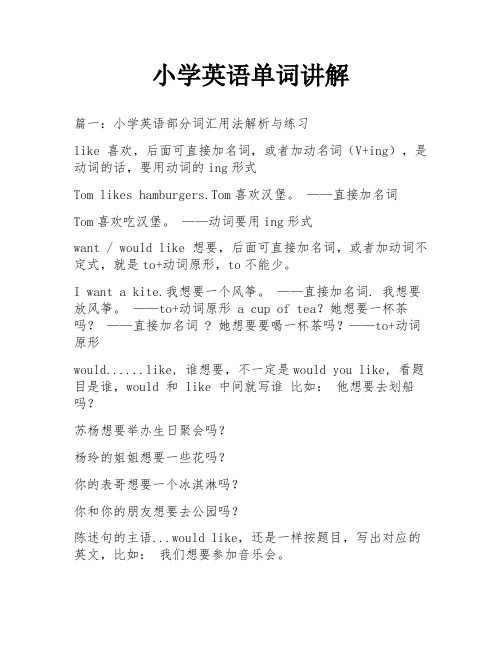
小学英语单词讲解篇一:小学英语部分词汇用法解析与练习like 喜欢,后面可直接加名词,或者加动名词(V+ing),是动词的话,要用动词的ing形式Tom likes hamburgers.Tom喜欢汉堡。
——直接加名词Tom喜欢吃汉堡。
——动词要用ing形式want / would like 想要,后面可直接加名词,或者加动词不定式,就是to+动词原形,to不能少。
I want a kite.我想要一个风筝。
——直接加名词. 我想要放风筝。
——to+动词原形 a cup of tea?她想要一杯茶吗?——直接加名词 ? 她想要要喝一杯茶吗?——to+动词原形would......like, 谁想要,不一定是would you like, 看题目是谁,would 和 like 中间就写谁比如:他想要去划船吗?苏杨想要举办生日聚会吗?杨玲的姐姐想要一些花吗?你的表哥想要一个冰淇淋吗?你和你的朋友想要去公园吗?陈述句的主语...would like,还是一样按题目,写出对应的英文,比如:我们想要参加音乐会。
他们的亲朋好友想要看京剧。
Jim 想要一台电脑。
介词后面的动词用动名词/动词ing形式running.flying kites.taking part in singing contest.going to a park?doing homework.还有with, of, for...接动词的话,要用动名词形式。
人称代词在动词和介词(at, about, with, of , for, in, on, under, behind, beside) 后要用宾格人称代词综合练习题:1. is my friend.他是我的朋友。
2.我的狗喜欢她。
3. Who is there? It’. 是谁啊?是我。
4.跟我来。
5. .你们的教室比我们的要大。
6. 我们是中国人。
7. . 我想买些气球送给他。
8.这些是我们的照片。
高中单词配套练习题及讲解
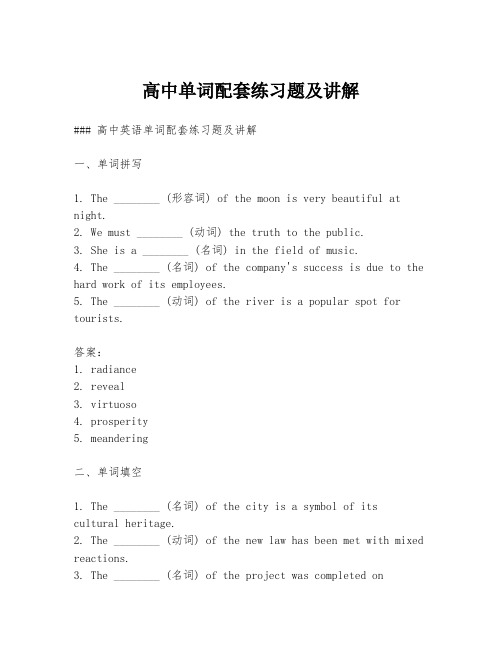
高中单词配套练习题及讲解### 高中英语单词配套练习题及讲解一、单词拼写1. The ________ (形容词) of the moon is very beautiful at night.2. We must ________ (动词) the truth to the public.3. She is a ________ (名词) in the field of music.4. The ________ (名词) of the company's success is due to the hard work of its employees.5. The ________ (动词) of the river is a popular spot for tourists.答案:1. radiance2. reveal3. virtuoso4. prosperity5. meandering二、单词填空1. The ________ (名词) of the city is a symbol of itscultural heritage.2. The ________ (动词) of the new law has been met with mixed reactions.3. The ________ (名词) of the project was completed onschedule.4. The ________ (形容词) of the novel lies in its intricate plot.5. The ________ (名词) of the old building was a major concern for the city council.答案:1. architecture2. implementation3. completion4. fascination5. dilapidation三、单词选择1. The ________ (A. architect B. artist) of the bridge was a famous figure in the 20th century.2. The ________ (A. innovation B. tradition) of the company is to always be at the forefront of technology.3. The ________ (A. expansion B. contraction) of the business has been steady over the past decade.4. The ________ (A. adaptation B. transformation) of the novel into a movie was well-received by critics.5. The ________ (A. exploration B. exploitation) of natural resources is a controversial issue.答案:1. A. architect2. A. innovation3. A. expansion4. A. adaptation5. B. exploitation四、单词使用1. The ________ of the ancient ruins is a complex task that requires careful planning.2. The ________ of the new policy has been a topic of heated debate.3. The ________ of the company's logo is a symbol of its commitment to the environment.4. The ________ of the novel's characters is what makes the story so compelling.5. The ________ of the old factory is a testament to thecity's industrial past.答案:1. preservation2. enactment3. depiction4. development5. preservation五、翻译练习1. 这个新发现的化石为我们提供了关于古代生物的宝贵信息。
一年级上册单词拼写练习题及讲解
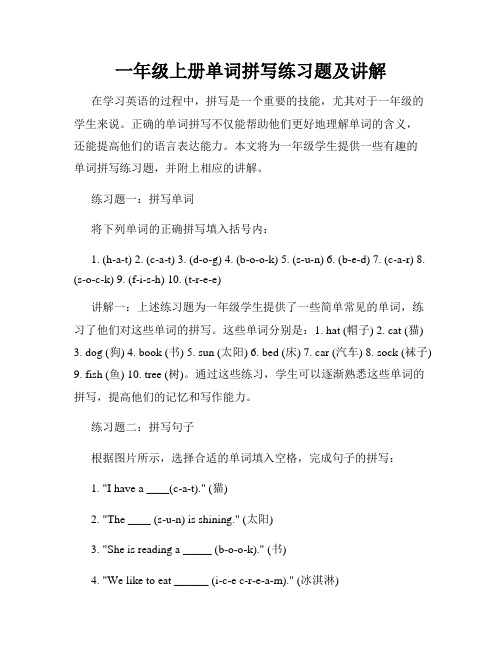
一年级上册单词拼写练习题及讲解在学习英语的过程中,拼写是一个重要的技能,尤其对于一年级的学生来说。
正确的单词拼写不仅能帮助他们更好地理解单词的含义,还能提高他们的语言表达能力。
本文将为一年级学生提供一些有趣的单词拼写练习题,并附上相应的讲解。
练习题一:拼写单词将下列单词的正确拼写填入括号内:1. (h-a-t)2. (c-a-t)3. (d-o-g)4. (b-o-o-k)5. (s-u-n)6. (b-e-d)7. (c-a-r)8. (s-o-c-k)9. (f-i-s-h) 10. (t-r-e-e)讲解一:上述练习题为一年级学生提供了一些简单常见的单词,练习了他们对这些单词的拼写。
这些单词分别是:1. hat (帽子) 2. cat (猫) 3. dog (狗) 4. book (书) 5. sun (太阳) 6. bed (床) 7. car (汽车) 8. sock (袜子) 9. fish (鱼) 10. tree (树)。
通过这些练习,学生可以逐渐熟悉这些单词的拼写,提高他们的记忆和写作能力。
练习题二:拼写句子根据图片所示,选择合适的单词填入空格,完成句子的拼写:1. "I have a ____(c-a-t)." (猫)2. "The ____ (s-u-n) is shining." (太阳)3. "She is reading a _____ (b-o-o-k)." (书)4. "We like to eat ______ (i-c-e c-r-e-a-m)." (冰淇淋)5. "The ______ (b-e-d) is soft." (床)讲解二:这部分练习题通过图片引导学生进行单词选择,并将这些单词填入句子中的空格。
学生需要根据图片的内容,选择适当的单词进行拼写。
通过这种方式,学生既能进一步巩固已学过的单词,也能增加他们对句子结构的理解。
六年级上册英语重点词汇讲解及练习-教师版

六年级上册重点词汇讲解及练习17中学六年级上册Unit 1 单词讲解displayed在博物馆里:the cinema the cinema在医院里:The area where people can cross safelycrossingv:cross the roadadv\prep: across the street; 在...对面acrossTake turns doing/to do sth关闭:调高:turn 调低:turnone's leftAll That'ssth.;12. be of interest, funny Sth sb.=Sb showsin sth.=Sth makes =Sb sth.=Sth interestssb. ...对...感兴趣13. Italian 重音:Italian; 意大利:Italythe street到达:get here /there/home =arrive here/there/home=reach here/there/home 到这/到那/到家归还:give 放弃:give17. far:be 离…远; 据...,就...far告诉某人做:tell sb (not)to do.讲故事\笑话\实话\谎话tell a story\a joke\the truth\a lie六年级上册Unit 1 单元练习一、单项选择( ) 1. -_____ is the hospital? -It’s over there.A. WhyB. WhereC. When( ) 2. _____ clever boys they are!A. WhatB. HowC. Which( )3. –Excuse me, sir. Where can I send the postcard? -You can send it in the _____.A. science museumB. post officeC. hospital( ) 4. The park is _____ the post office.A. inB. onC. next to( ) 5. What _____ interesting book!A. anB. aC. the( )6. The hospital is _____ Dongfang Street.A. atB. onC. to( ) 7. -_____ can I get to the science museum? -Go straight. Turn right at the hospital.A. HowB. WhereC. When( ) 8. Mary wants to see a film. She is going to the _____.A. cinemaB. hospitalC. museum( )9. Let’s _____ first. I am so hungry.A. eatB. to eatC. eating( ) 10. The park is _____ the cinema.A. in front ofB. in the front ofC. near to( ) 11. --_____hard the students work in the classroom. --Everybody is busy with his work.A. What aB. WhatC. How( ) 12. Jack sits in front of me. So I sit _____ him.A. beforeB. nearC. behind( ) 13. Turn right _____ the cinema.A. atB. inC. on( )14. --Can you jump _____ the wall? --It's very tall.A. overB. onC.to( )15. Mary can help you _____ the cinema.A. findsB. findingC. find( )16. –What time does Mike usually get _____ the shop? --At seven.A. toB. atC. up( )17. –I'm so hungry. I know _____Italian restaurant --Really? Let's go.A. aB. anC. \( )18. –Tom is a kind boy. He is trying____ a tour guide for Oliver in Beijing now?--What a god boy he is!A. beB. to beC. to being( )19. –What do you think of the book? --I'm_____ in reading it. It's an_____ storyA. interested, interestedB. interesting, interestedC. interested, interesting( )20. –_____ there a desk or any chairs in the room? --No, there is nothing in the room.A. AreB. IsC. Have二、用所给词的正确形式填空1. There is _______________(a) Italian restaurant near the library.2. Let _____________(we) go!3. Can you help ______________(they)?4. ________________(be) your sister’s parents in the library?5. Mike’s brother likes _________________(go) swimming.6. My brother likes _________________(run) very much.7. We should wait at the __________________(cross).8. Can you help ___________________(his)?9. I want to see an ___________________ (interest) film with my friend.10.I like to eat ___________________ (Italy) food very much.三、翻译句子1.博物馆的商店在哪?________________ is the ___________________ shop?2.在大门附近。
- 1、下载文档前请自行甄别文档内容的完整性,平台不提供额外的编辑、内容补充、找答案等附加服务。
- 2、"仅部分预览"的文档,不可在线预览部分如存在完整性等问题,可反馈申请退款(可完整预览的文档不适用该条件!)。
- 3、如文档侵犯您的权益,请联系客服反馈,我们会尽快为您处理(人工客服工作时间:9:00-18:30)。
n. 斗争,奋斗 I will never give in to difficulties without a struggle. 语法填空 with/against 1. Lisa struggled _________ her conscience before talking to the police. for 2. They were very poor and had to struggle _______ a living. to keep (keep) my balance on my new 3. I struggled _________ skates. to his feet and 4. The wounded soldier struggled _____ continued walking forward with difficulty.
Key words and phrases
try to do sth. 尽力去做某事 try doing sth. 尝试做某事 I'm trying to work out this difficult math problem. Why not try speaking something in English?
more than 1. more than + 数字 “超过,多于” 相当于over I have known him more than 10 years. 2. more than + 名词 “ 不只是,不仅仅” ,相当于 not only. He is more than a teacher, he is a singer, too. 3. more than + adj./adv./分词/v. “很,非常” 相当于 very (much). I'm more than pleased to hear from you. I'm more than happy to see you.
语法填空 going 1. All the staff in our company are considering ______ ( go ) to the city center for the fashion show.
2. My parents are considering ________ buying ( buy ) a computer, which is considered ________ ( be ) of great to be help in my work and study. to have made 3. Charles Chaplin is considered _______________ ( make ) a great contribution to the film industry.
be satisfied with 对……感到满意 Our teacher is very satisfied with our performance. I'm not satisfied with your answer. 归纳拓展: satisfy vt. 使满意,使满足 satisfy one's needs/ demands/ curiousity 满足某人 的需要/需求/好奇心 satisfaction n. 满足,满意 to one's satisfaction 使某人满意的是 with satisfaction 满意地
rid vt. 摆脱,除去 rid...of... 使……摆脱或除去 be/get rid of... 摆脱…… You must be rid of that bad habit. 我仍然不能摆脱感冒。 be/get rid of the cold. I still can't _____________
用适当的单词或短语替换划线部分 1. I'm more than willing to take you and your friend
to the railway station. very
2. More than ten students in that school were sent
abroad to study medicine last year. over
try one's best 尽某人最大的努力 try on 试穿
1. Since the time humankind started gardening, to make ( make ) our we have been trying __________ environment more beautiful. knocking 2. Try ________ ( knock ) at the back door if nobody hears you at the front door. 3. Never buy shoes without trying them on _______.
2. vt. 仔细考虑,细想 consider doing sth. 考虑做某事 consider +疑问词 +to do 仔细考虑…… I'm considering going to Beijing tomorrow. I'm considering how to solve this problem.
struggle v. 奋斗,努力,斗争 struggle for... 努力争取……,为……而斗争/奋斗 struggle to do sth. 努力/争取做某事 struggle with/against 与……作斗争 struggle to one's feet 挣扎着站起来 The two leaders are struggling for power. I struggle to finish my homework ahead of time. He struggled against cancer for three years. Lucy struggled to her feet and went to school.
3. The book is more than a grammar book; it can be used as a dictionary. not only
完成句子 1. 我难以描述那个村庄的美。 The beauty of the village is more than I can describe ___________________________. 2. 与其说他笨不如说他懒。 lazy than stupid He is more ________________________. 3. 昨天听众多达五千人。 The number of the audience was _________________________ no less than five thousand yesterday.
4. more than + 句子 (句中常含有can 或 could ) “非……所能”,“是……难以……的” The beauty of the West Lake is more than I can imagine. 归纳拓展: more... than... 与其说……倒不如说…… no more than 不超过,仅仅 no less than 多达 not more than 顶多 not less than 不少于 rather than 而不是
单句改错 1. More than one house were burnt down in the fire. were→was 2. Many a student are interested in swimming. are→is
consider 1. vt. 认为,觉得 consider sb./sth. (to be) + adj./n. 认为某人/某 物…… consider sb./sth. ( as ) +n. 认为某人/某物…… be considered to have done sth. 被认为做了某事 We consider Jim to be/ as the cleverest boy in our class. He is considered to have gone aborad.
用disturb 的适当形式填空 1. The mother opened the door quietly so as not to disturb the sleeping baby. _________ disturbed to hear that they were getting 2. I was _________ divorced.
The county has expanded into a large city.
vi. 详述,细谈 expand on/upon sth. 详述,充分叙述 He expanded on his new theory. 语法填空 into 1. His small business eventually expanded ______ a business empire. on/upon the matter a little 2. Would you expand _________ further?
hunger n. 饥饿;欲望→adj. hungry 饥饿的
die of hunger 死于饥饿
have a hunger for 渴望……
In the past, many people died of hunger.
I have a hunger for a computer.
v. 饥饿;渴望得到
hunger to do sth. 渴望做某事
I hunger to go out to play with my friends.
